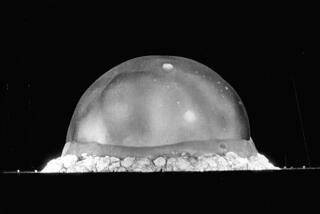âStar Warsâ Beam Weapon Has Successful Space Test
WASHINGTON â The Pentagon Monday announced the successful space test of an experimental beam weapon in what âStar Warsâ program officials called a major milestone for the anti-missile system.
The neutral particle beam accelerator was launched into space from White Sands Missile Range in New Mexico last Thursday and operated for four minutes, officials said, sending out pulses of energy. Military scientists hope that such energy pulses one day will be capable of destroying incoming enemy missiles.
The neutral particle beam is one of three âdirected energyâ weapons being developed by the âStar Warsâ program, formally known as the Strategic Defense Initiative. The others are free-electron lasers and chemical lasers.
Long-Term Projects
All are long-term development projects that are not expected to be deployed until well into the 21st Century, if future administrations support the program and Congress is willing to fund it.
âThe particle beam worked perfectly. Thatâs a major engineering achievement,â Air Force Col. Thomas Meyer, director of SDIâs energy office, said at a Pentagon news conference Monday.
The 24-foot, 3,500-pound beam accelerator was launched to an altitude of 125 miles on a Minuteman 2 rocket. It was the first time that the device had been tested in space.
The accelerator creates an energized beam of hydrogen atoms carrying no electrical charge. SDI scientists explained that the beam is created by powerful accelerators propelling negative atoms that are stripped of their extra electron as the beam emerges from the device at nearly the speed of light.
Meyer said that the beam does not burn through metal but rather penetrates the warhead and then releases its energy. âWe call them proton torpedoes,â he said.
Spots Decoys
The weapon is designed to distinguish between nuclear warheads and decoys by estimating their weight based on the resistance encountered by the beam, officials said. The beam can also be used to destroy warheads by disrupting their electrical and guidance systems.
The SDI program spent $60 million on the test, known as Beam Experiment Aboard Rocket or BEAR. The Pentagon is spending $100 million on the entire beam program this year.
The Pentagon said that the test complied with the 1972 Antiballistic Missile Treaty, which bans most missile defense systems.
More to Read
Sign up for Essential California
The most important California stories and recommendations in your inbox every morning.
You may occasionally receive promotional content from the Los Angeles Times.








